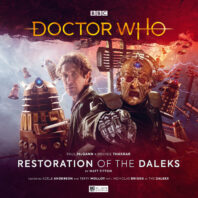
Released September 2020
SOME SPOILERS FOLLOW
With the Time War saga to this point advertised as a sixteen-part tale, ‘Restoration of the Daleks’ by Matt Fitton looks to bring to a close the audio adventures of the Eighth Doctor that have sprawled across all of time and space as the conflict between the Time Lords and the Daleks continues to intensify.
Although it was with an alternative version of Davros rather than the original iconic version himself, the ‘Palindrome’ two-parter that opened this fourth series did attempt to do something novel with a character whose every nuance- or lack thereof- is known. Unfortunately, as the Dalek threat becomes re-established in this universe that had forgotten it, anything unique is completely set aside to give perhaps the most intense and stereotypical version of Davros to date. While the prospect of the Daleks being able to tap into the multiverse to instantly replace their losses ad infinitum is genuinely frightening, the story told is ultimately the same power struggle between Davros and the Daleks that has been told countless times before. There are a few more elements of the multiverse thrown in as the Daleks feed off of their creator in his many iterations to draw all Daleks here, but narratively there is nothing new here that hasn’t already been thoroughly explored; sadly, the Doctor casually mentioning that he is witnessing all of Dalek history in one go as the consequences of the Time Strategist’s plan to revive the Emperor come into direct conflict with Davros’s own desire and genuine need to remain in control of his creations only serves to reinforce how familiar this all is.
As misguided and genuinely evil as he is, Davros has always been a tragic figure, and the almost fatherly obsession he has with needing to be needed by his children is an angle that could have been played up more throughout to good effect. Instead, the game of one-upmanship persists as the Time Strategist looks to use Davros to reinforce its ranks while Davros looks to serve as a god for a new version of Dalek with its own pure evil and hatred that he has created to ravage the universe. Davros has wanted to destroy everything including reality itself in other stories, and so his desire to fill the universe with perpetual war is certainly a logical extension for the man who has created the universe’s most ruthless race. Still, the Time War is a period of infinite potential, and so it’s disappointing that Davros- even this alternate version that took two episodes to build up- follows so many familiar beats that are ultimately undone relatively easily by the Doctor and Bliss with their colleagues in a short period of time. This entire set has sort of been treading water to re-establish the known dynamic of the Time War, and culminating it with such a traditional story- even one dressed up with a multiverse veneer- is a disappointingly familiar ending point.
Of course, along with the direction and sound design, the performances across the board are uniformly excellent, and Terry Molloy and Nicholas Briggs deserve immense credit for the incredible layers they put into their respective roles as Davros and the many versions of the Daleks on display. ‘Restoration of the Daleks’ isn’t quite the showcase for the Eighth Doctor and Bliss that one might expect from a finale, but Paul McGann and Rakhee Thakrar are likewise excellent in their scenes to add a needed human level of emotion of these affairs that carry such awe-inspiring consequences. Yet although the cliffhanger suggests that the adventures of this duo in this setting may not yet be finished, the sheer overfamiliarity of the plot hardly matches the amazing potential of the backdrop and the chance to do something genuinely unique.
- Release Date: 9/2020


Leave a Reply